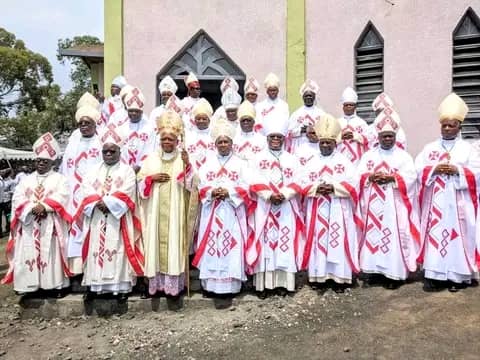
Peace in the Great Lakes region at the heart of the meeting of the Bishops of the ASECAC in Goma
Commitment of Bishops from Burundi, the DRC, and Rwanda
The Goma diocese hosted bishops who are members of the Association of Episcopal Conferences of Central Africa (ASECAC). They gathered in Goma, Democratic Republic of Congo, from January 26th to 29th to pray for peace and to urge public authorities in the Great Lakes region to end the suffering of the populations in the eastern DRC and to build bonds of solidarity and fraternity that transcend divisions. The initiative to hold these days in Goma emerged during the bishops’ meeting in Rome from October 16th to 18th last year. In their joint exhortation, they committed to preaching fraternity to the public authorities of the Great Lakes. They recalled that building peace is not an isolated act but a common and collective work involving various layers of society and structures of various orders.
Call for solidarity and fraternity
The call from the ASECAC Bishops is therefore to urge all those directly or indirectly continuing to sow death, desolation, and division in this region to heed the Church’s call for peace in the region. They invite the populations of the three countries concerned (Congo, Rwanda, and Burundi), especially the youth and women, not to succumb to manipulation, hateful speeches, and divisive rhetoric. The bishops’ message also encourages various sub-regional and international organizations to consider the security situation in eastern DRC as a priority and to support ongoing peace processes in the Great Lakes region, which continues to be a major theater of division, so that they lead to the restoration of lasting peace.
Work of mercy: Bishops support displaced persons
Currently, the Goma diocese, where 8 out of the 33 parishes are under the occupation of the M23 rebels, continues to be the focus of bishops’ attention. Thus, the bishops expressed their closeness and, to put mercy into practice, they visited and provided assistance to war-displaced persons in the Lushagala camp, which now hosts over 90,000 households fleeing war and facing a dramatic humanitarian situation.
Empathy to resolve conflicts
In his Sunday homily for the peace mass held at the Parish of Our Lady of Mount Carmel in Goma, Cardinal Ambongo, Archbishop of Kinshasa and President of the Symposium of Episcopal Conferences of Africa and Madagascar (SECAM), emphasized to the faithful present that “our hearts have become insensitive to the misery of our neighbors,” and it is this indifference that fuels conflicts. He also provided some indications for resolving the crisis shaking the region. Regarding the resolution of the crisis in the Great Lakes region, Cardinal Ambongo urged Christians in these three countries to abandon indifference to the suffering of others and to show “a little humanity” to end this prolonged conflict tragedy.
Rising diplomatic tensions in the Great Lakes
This meeting bringing together bishops from three countries comes at a time of escalating diplomatic tensions in the Great Lakes sub-region. This is also due to Burundi’s decision to close its borders with Rwanda on January 11th. This escalation of tensions once again fuels the crisis in the region, which is already marked by conflict affecting a large part of the population in eastern Congo.
Mobilization and prayer for reconciliation
In an increasingly frosty diplomatic climate in the Great Lakes region, the bishops invite the populations of the region to unite and activate fraternity, solidarity, and prayer for peace. The bishops’ message is a message of peace because “he who desires peace prepares for peace.” They continue to address the countries of the Great Lakes to use the means at their disposal to restore peace and proclaim the gospel of peace. The prelates reiterated their commitment to reach out to all layers of the population, citizens, and leaders, so that peace can return to the region. “Blessed are the peacemakers, for they will be called children of God” (Mt 5:9).
